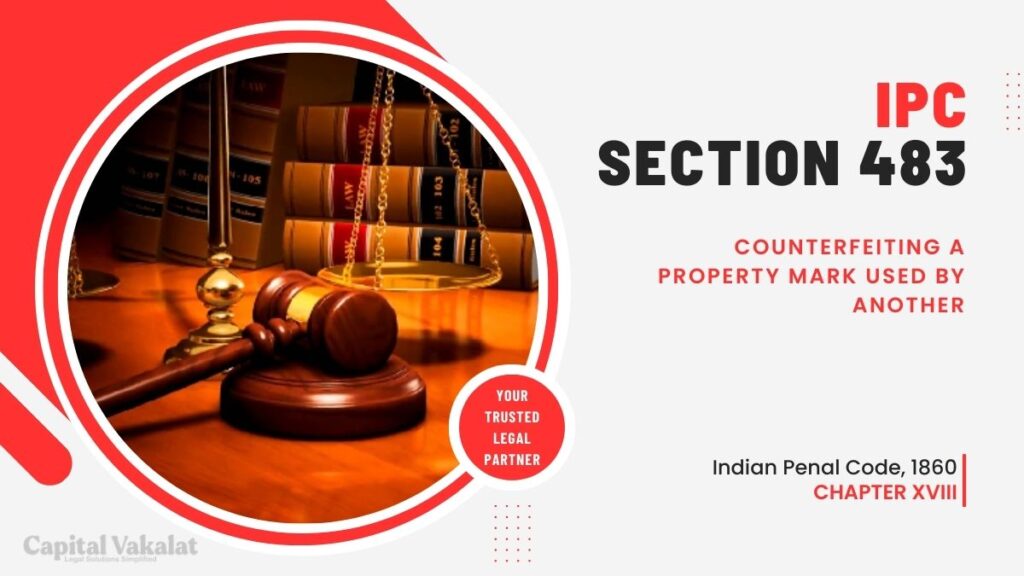Counterfeiting a property mark used by another is a serious offense, and understanding the legal implications is crucial for both individuals and businesses.

In this article, we will delve into Section 483 IPC, exploring its intricacies, the elements of counterfeiting, legal consequences, enforcement challenges, and the broader impact on a global scale.
Understanding Section 483 IPC
Section 483 of the Indian Penal Code (IPC) addresses the criminal act of counterfeiting a property mark used by another. A property mark is a distinctive symbol, logo, or identification method associated with a particular individual or entity. Counterfeiting, in this context, involves the unauthorized replication or imitation of such marks with the intention to deceive or mislead.
Elements of Counterfeiting
To be charged under Section 483 IPC, certain elements must be present. Firstly, there must be a clear intent to deceive or defraud. The counterfeit mark must also be identical or substantially similar to the original property mark. This section aims to protect the unique identifiers that individuals and businesses use to distinguish their products or services.
Legal Consequences
The legal consequences of counterfeiting a property mark are severe. Section 483 IPC prescribes penalties, including fines and imprisonment. Individuals or entities found guilty may face both civil and criminal actions. To illustrate, recent case studies highlight instances where counterfeiters faced significant legal repercussions, serving as a deterrent to others.
Challenges in Enforcement
Enforcing Section 483 IPC poses various challenges. Identifying counterfeit property marks requires a collaborative effort between law enforcement agencies, trademark owners, and the public. The rise of online platforms has further complicated matters, with counterfeiters operating across borders, making it challenging to track and prosecute them.
Protecting Your Property Marks
Businesses and individuals must take proactive measures to protect their property marks. Registering trademarks and other intellectual property rights is a crucial step in safeguarding against counterfeiting. Collaborating with law enforcement agencies to share information and intelligence can enhance efforts to combat this illicit activity.
Real-world Impacts
Counterfeiting has significant economic consequences, impacting industries globally. Consumers are also at risk, as counterfeit products may lack quality control and pose health and safety hazards. The article explores real-world scenarios where the proliferation of counterfeit property marks has led to financial losses and harm to unsuspecting consumers.
Global Perspective on Counterfeiting
Counterfeiting is not confined to national borders. The article provides insights into international efforts to combat counterfeiting, emphasizing the need for global cooperation. Interpol and other organizations play a vital role in coordinating actions against transnational counterfeiting networks.
Case Studies
Examining notable case studies sheds light on the multifaceted nature of counterfeiting property marks. From luxury goods to pharmaceuticals, various industries have been affected. Lessons learned from these cases underscore the importance of constant vigilance and adaptive strategies to stay one step ahead of counterfeiters.
Conclusion
In conclusion, Section 483 IPC is a crucial legal provision aimed at protecting property marks from counterfeiting. The battle against counterfeiters requires a comprehensive approach involving legislation, enforcement, and collaboration between stakeholders. As technology advances, so do the challenges, making it imperative for legal frameworks and enforcement mechanisms to evolve accordingly.
Frequently Asked Questions
How can I register my property mark to ensure legal protection?
To register your property mark, you can apply for a trademark through the relevant intellectual property office in your jurisdiction.
What are the potential civil actions that can be taken against counterfeiters?
Civil actions may include seeking damages, injunctive relief, and the destruction of counterfeit goods.
How does the rise of e-commerce impact the enforcement of Section 483 IPC?
The proliferation of e-commerce has made it more challenging to track and prosecute counterfeiters operating online, requiring enhanced cooperation between authorities and online platforms.
Are there international organizations specifically dedicated to combating counterfeiting?
Yes, organizations like Interpol and the World Intellectual Property Organization (WIPO) actively work on a global scale to combat counterfeiting.